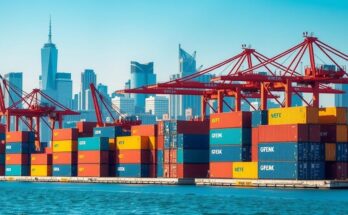The economic landscape is currently tumultuous as former President Donald Trump introduces sweeping tariffs under what he calls “Liberation Day.” While claiming these measures will bolster the U.S. economy, they have sparked widespread panic, as reflected in the S&P 500’s 10% drop, erasing billions in retirement savings. Notably, Federal Reserve Chair Jerome Powell warns of potential inflation and slowed growth as a result of these tariffs.
Economists widely challenge Trump’s assertion that tariffs will stimulate domestic manufacturing while avoiding costs. Instead, many argue tariffs act as taxes, ultimately passed on to American consumers and businesses. Mark Zandi of Moody’s Analytics states, “Tariffs are essentially a tax, and like all taxes on imports, they’re paid by American consumers.”
Historically, tariffs have seldom delivered the promised economic benefits, often leading to retaliation and supply chain disruptions. This skepticism is palpable in the financial markets, indicating deep misgivings regarding Trump’s approach.
Legally, Congress holds the power to impose tariffs, traditionally executed only in emergencies. Trump’s unilateral action has invoked a heated debate regarding executive overreach. Senator Angus King expresses grave concern, remarking, “This is a five-alarm fire,” and advocates for Congress to reclaim its authority.
Furthermore, some observe a sinister aspect to Trump’s tariffs, hinting they may be utilised as political leverage rather than economic strategy. Senator Chris Murphy articulates that tariffs could be a “super dangerous political tool,” warning it mirrors historical taxation abuses by despotic leaders.
Murphy asserts that tariffs are weaponised to extract political loyalty from corporations and institutions, ultimately endangering democratic principles. This method of coercing industry leaders into supporting Trump’s policies or suppressing dissent in exchange for tariff relief threatens the health of U.S. democracy, he warns.
Such dynamics raise alarms about a possible drift towards autocracy, challenging the system’s checks and balances. Senator King warns of the risks involved in concentrating power, stating, “The structural collapse of our system is dangerous.”
As these events unfold, the implications are profound. Trump’s tariffs not only represent an economic dilemma but also present a constitutional and democratic crisis. Amidst the uncertainty, Americans face exacerbating economic pressures, questioning whether these moves reflect sound policy or the dawn of authoritarianism.
Former President Trump’s new tariffs are causing economic turmoil and raising concerns about executive overreach. While he claims that these measures will stimulate the economy, economists warn that they may lead to inflation and higher prices for consumers. Critics argue the tariffs could be a tool for political coercion, threatening constitutional governance and democracy.
In conclusion, Trump’s proposed tariffs are creating significant economic upheaval while raising serious constitutional concerns. Critics assert that this unilateral approach may threaten the delicate balance of power, showcasing the potential for tariffs to be exploited as tools of political manipulation. As markets deteriorate and prices rise, the ramifications extend far beyond mere economic metrics, evoking fears of democratic erosion and authoritarian governance.
Original Source: www.fingerlakes1.com



